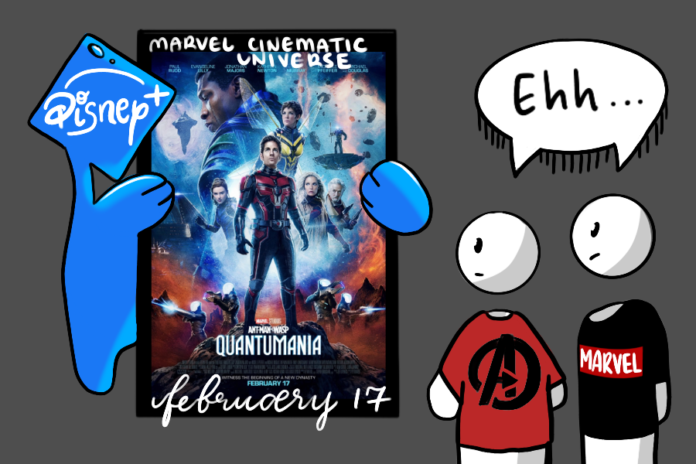The disappointing trend of one cinematic flop after another
By MAYA KORNYEYEVA — mkornyeyeva@ucdavis.edu
Disclaimer: This article contains spoilers for “WandaVision,” “Loki” and “The Falcon and the Winter Soldier.”
I would argue that the release of the first “Iron Man” was a pivotal moment in the blockbuster film industry. Before then, I had always seen comic books as niche areas of entertainment that the general movie-goer wasn’t particularly interested in. Fast forward to 2019, the epic fourth and final installation of the Avengers series hit the screens and garnered a whopping $2.8 billion at the box office.
People who had never seen a single Marvel movie came to watch, as did fans of all ages. It seemed that everyone was packing into the theaters to view this cinematic spectacle, and boy did it not disappoint. With a 94% Rotten Tomatoes Tomatometer score and an audience score of 90%, “Avengers: Endgame” was a triumph of superb acting and state-of-the-art CGI. I, like many others, expected Marvel to only get better from there — with graphic imaging being revolutionized practically every day and a breadth of new characters to introduce, up was seemingly the only direction to go.
Then Disney+ launched. At first glance, this was a Disney fan’s dream; the entire collection of Disney animated movies, the Marvel Cinematic Universe (MCU), Star Wars and National Geographic were at their fingertips. Take another look, and the motivations behind such a development also become apparent — money, of course. An online streaming platform seemed like the perfect place to launch a brand new image of the MCU as an interconnected world of behind-the-scenes documentaries, cartoons and shows, and make some money off of viewers in the process. Hint: this is where it all goes downhill.
I don’t deny that I was excited for the first Marvel TV series, “WandaVision,” as well as the “Loki” series and “What If?” I was genuinely curious as to how Marvel would adapt their storytelling to fit an episodic format. For me, though, watching “WandaVision” was a bit of a mixed experience. I loved the way the directors and producers adapted a sitcom style to depict an unnerving alternate universe of Wanda’s own creation — the motifs used to deal with loss and derealization were unique and refreshing. What wasn’t was the introduction of Agatha as a villain and witchcraft as a legitimate part of the MCU.
And it didn’t stop there. With “Loki” came the idea that the all-important infinity stones were being used as paperweights at the TVA, and “The Falcon and the Winter Soldier” introduced a plot of a strange and illogical post-blip world. Over the next several years, Disney funded more and more shows that quickly oversaturated the MCU and lowered the quality standard for their films.
Suddenly, I stopped being interested in their new shows, mainly because it became increasingly difficult to keep up with all of the new Phase Four installations. It was as if the tracks that the “Marvel Train” was riding on suddenly lifted off the ground and split into a thousand different directions. There was also a significant dip in the quality and directing of Marvel movie sequels; a few prime examples include “Thor: Love and Thunder” and “Ant Man: Quantumania,” which garnered 63% and 47% Rotten Tomato Tomatometer scores respectively.
Now I, and many original Marvel fans, are longing for a return to the pre-Disney+ era. The nostalgia and character building of the first original “Captain America,” “The Avengers” and “Iron Man” series created movie experiences that deeply resonated with viewers and presented them with exciting visuals and well-written films. More importantly, I can contentedly watch the Phase One and Two Marvel movies over and over again, never getting bored.
While “Black Panther: Wakanda Forever” has given me hope that a return to such an MCU is not an unattainable dream, that hope remains slim as long as Disney’s profit-oriented approach holds the reins. What Marvel Studios desperately needs is to stop stretching its budget thin and instead dedicate sufficient resources, time and talent to developing high-quality movies that don’t muddle and confuse pre-established storylines. Fans are already turning their backs; now is the time to recapture their interest and stop them from walking away for good.
Written by: Maya Kornyeyeva — mkornyeyeva@ucdavis.edu
Disclaimer: The views and opinions expressed by individual columnists belong to the columnists alone and do not necessarily indicate the views and opinions held by The California Aggie.










